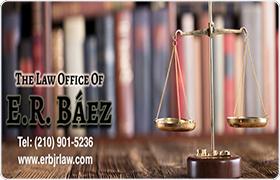Universal City RICO Act Lawyer, Texas
Sponsored Law Firm
-
 x
x

Click For More Info:
-
The Law Office of E.R. Báez
700 N. Saint Mary's Street Suite 1400 San Antonio, TX 78205» view mapCriminal Defense Law The Pastor Lawyer
Every client is special to us and every client will be treated with respect and dignity. No matter how difficult the case may be, Mr. Báez will treat you with the upmost dignity.
800-903-7181
Not enough matches for Universal City RICO Act lawyer.
Below are all Universal City Criminal lawyers.
FREE CONSULTATION
CONTACTScott Edgar Harding
Criminal, Military, Administrative Law
Status: In Good Standing Licensed: 30 Years
Brian Hun Adams
Criminal, Family Law, Administrative Law, Employee Rights
Status: In Good Standing Licensed: 16 Years
 E.R. Báez San Antonio, TX
E.R. Báez San Antonio, TX Practice AreasExpertise
Practice AreasExpertise